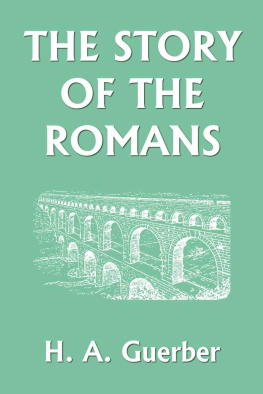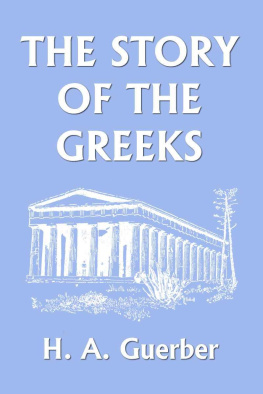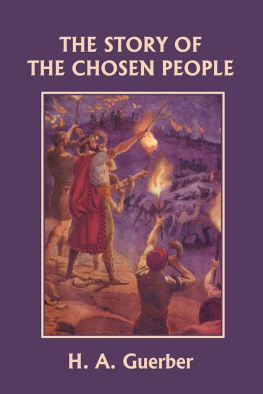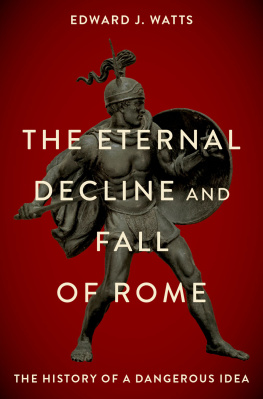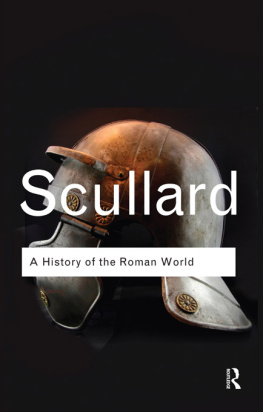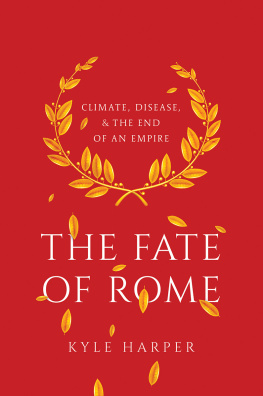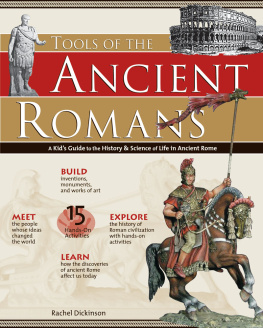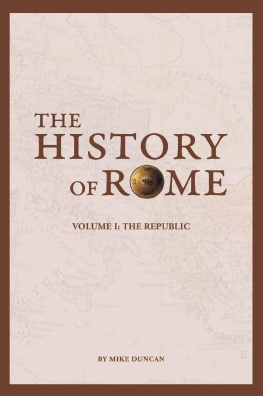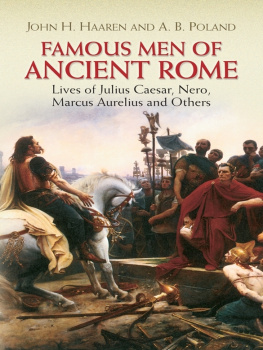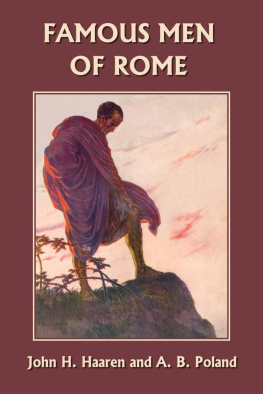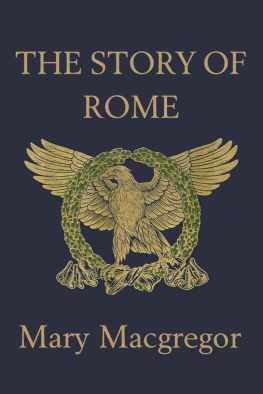The Story of the Romans
by
H. A. Guerber
Yesterday's Classics
Chapel Hill, North Carolina
Cover and Arrangement 2010 Yesterday's Classics, LLC
All rights reserved. No part of this book may be reproduced or retransmitted in any form or by any means without the written permission of the publisher.
This edition, first published in 2010 by Yesterday's Classics, an imprint of Yesterday's Classics, LLC, is an unabridged republication of the work originally published by American Book Company in 1896. This title is available in a print edition (ISBN 978-1-59915-011-6).
Yesterday's Classics, LLC
PO Box 3418
Chapel Hill, NC 27515
Yesterday's Classics
Yesterday's Classics republishes classic books for children from the golden age of children's literature, the era from 1880 to 1920. Many of our titles are offered in high-quality paperback editions, with text cast in modern easy-to-read type for today's readers. The illustrations from the original volumes are included except in those few cases where the quality of the original images is too low to make their reproduction feasible. Unless specified otherwise, color illustrations in the original volumes are rendered in black and white in our print editions.
Preface
This elementary history of Rome, since it is intended for very young readers, has been related as simply and directly as possible. The aim is not only to instruct, but to interest, school children, and to enable them, as it were in play, to gain a fair idea of the people and city of which they will hear so much.
This book is also planned to serve as a general introduction to the study of Latin, which most pupils begin before they have had time to study history. With little, if any, knowledge of the people who spoke the language they are learning, children cannot be expected to take so lively an interest in the study as they would if they knew more. Many a schoolboy is plunged into the Commentaries of Csar before having any idea of the life of that great man; and, as the information gained about him through the Latin is necessarily acquired piecemeal and slowly, it is no great wonder that Csar has been vaguely, yet vindictively, stigmatized as "the fellow who fought a lot of battles just so he could plague boys."
By gaining a general idea of the great heroes of Roman history, a child's enthusiasm can be so roused that Latin will be connected ever afteras it should bewith a lively recollection of the great men who spoke and wrote it.
To secure this end, the writer has not only told the main facts of Roman history, but has woven in the narrative many of the mythical and picturesque tales which, however untrue, form an important part of classical history, literature, and art. Government, laws, customs, etc. have been only lightly touched upon, because children are most interested in the sayings and doings of people.
This volume may be used merely as a reader or first history text-book, but the teacher will find that, like "The Story of the Greeks," it can also serve as a fund of stories for oral or written reproduction, and as an aid to the study of European geography.
Maps, illustrations, and index have been added to enhance its usefulness and attractiveness, and wherever a proper name occurs for the first time, the pronunciation has been carefully marked as given by the best authorities.
The writer trusts that "The Story of the Romans" may prove sufficiently interesting to young readers to make them look forward to reading and learning more about the people to whom they are now introduced.
Contents
CHAPTER I
The First Settlers
Y OU are now going to hear about the building of Rome, the capital of Italy, in Europe. By looking at your maps, you will soon find in Europe a peninsula, shaped somewhat like a boot, and surrounded on three sides by the Mediterranean and Adriatic seas. This peninsula is Italy. To the north are the snow-topped Alps, a chain of high mountains which separate this country from the rest of Europe; and through the peninsula run the Apennines, a less lofty mountain range.
As Italy is in the southern part of Europe, it has a very mild and delightful climate. The tall mountains in the north prevent the cold winds from sweeping down upon it, and many plants which you see here in hothouses grow there in the open ground.
Orange and almond trees, camellias and pomegranates, are all covered with fruit or flowers, and the vine and olive both yield rich harvests in this beautiful land. The soil is so rich that people do not need to work very hard in order to have fine crops, and, as the weather is generally clear, they can live out of doors almost all the year round.
As the climate is so pleasant, the land so fertile, the skies so blue, and the views so beautiful, travelers have always liked to visit Italy, and have spoken about its charms to all they met. It is no wonder, therefore, that many people have gone to settle there, and you will easily understand that the whole country was occupied long, long ago.
So many years ago that no one can really tell when it was, Italy was already inhabited by a people who, judging from what we have heard of them, must once have lived in Central Asia. These people were probably crowded at home, and left their native land in search of good pasture for their cattle, and a fertile country where they might dwell.
They traveled on and on, day after day, and coming finally to the great mountains, some of them climbed up to see what was on the other side. When they beheld the green valleys of Italy, and saw how beautiful the country was, they told their companions, and all made haste to cross the mountains.
These people traveled on foot, with their families, cattle, and all their household goods; and they were very rude and uncivilized. Little by little, however, they learned to build houses, to cook their food, to make rude pottery from the clay they found in the valleys, to spin and weave the wool from their sheep, and to fashion this homemade stuff into garments.
Although each family at first lived by itself, they soon discovered that if several families joined together, they could cultivate the ground better, could hunt more successfully, and that in time of danger they could more easily defend themselves.
Thus several families would form a tribe under the strongest and cleverest man among them, whom they chose as their leader. These leaders selected the best place for them to settle in, told them what to do in time of war, and thus became chiefs or kings over their own tribes.
There were a number of such little kingdoms scattered throughout Italy, and as the people grew richer, wiser, and more numerous, they occupied more and more land.
Now it was from some of these tribes that the Romans were mostly descended. Their city became in time the greatest in the world, and many histories have been written about it; but none of them were begun until several centuries after Rome was founded. Hardly any records had been kept of the distant past, and the best that could be done was to write down some stories that had been told by parents to their children, and thus had been preserved from generation to generation. These had become much changed by being told so many times, and they were connected and rounded out by pure guesswork; but the whole was soon accepted as true, and was believed in by every one for ages.

